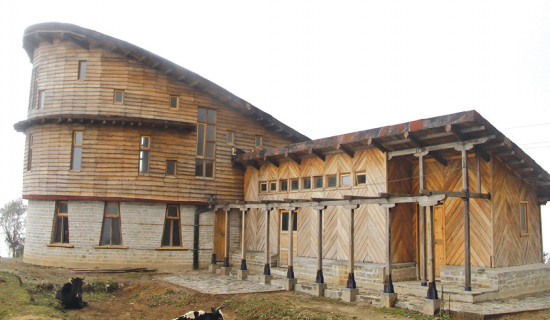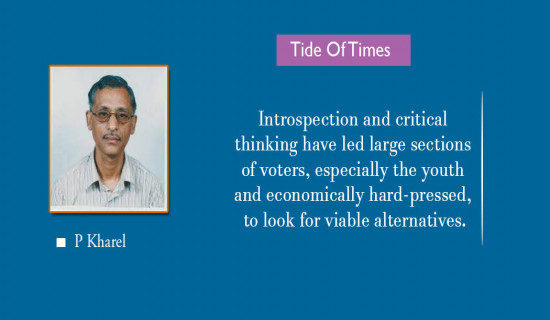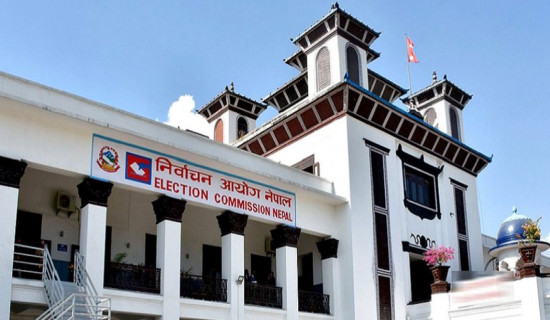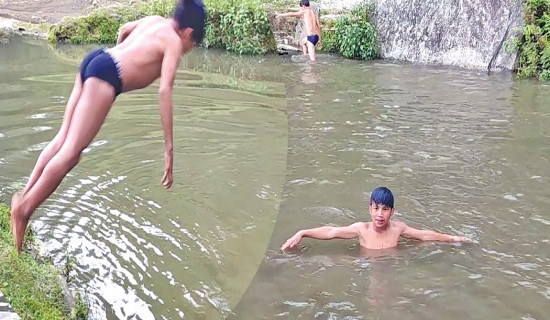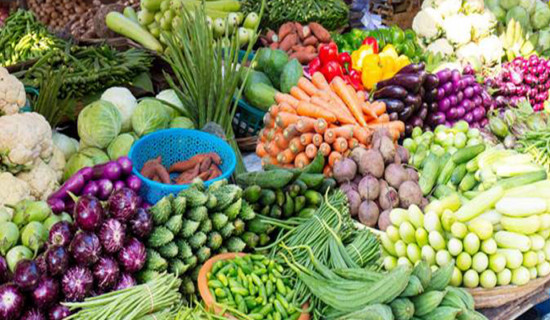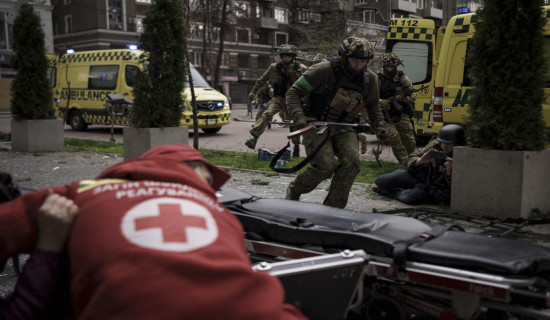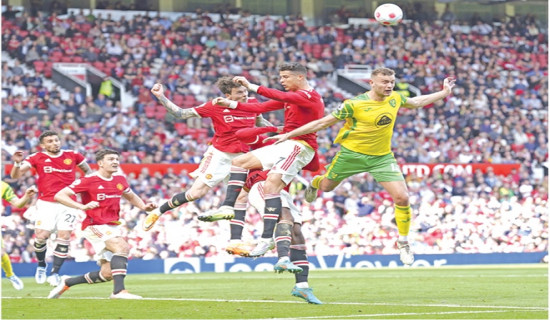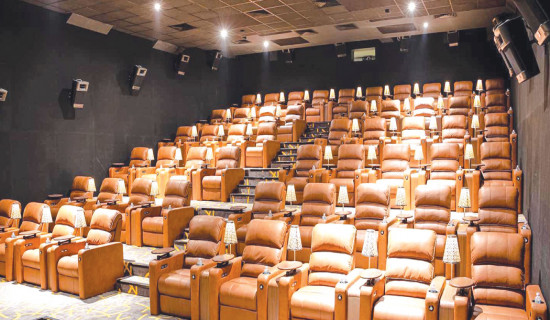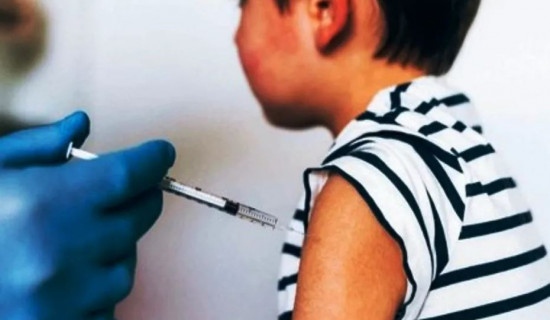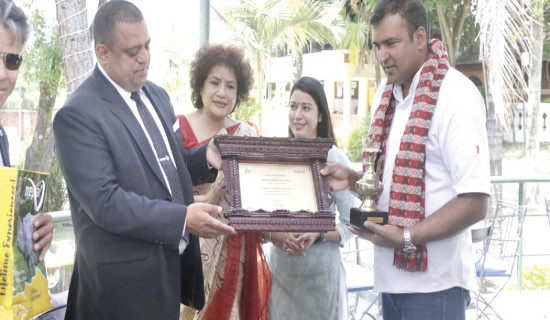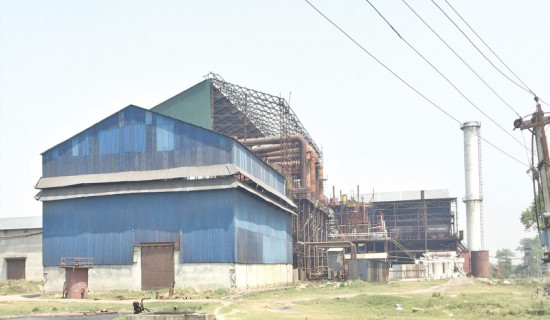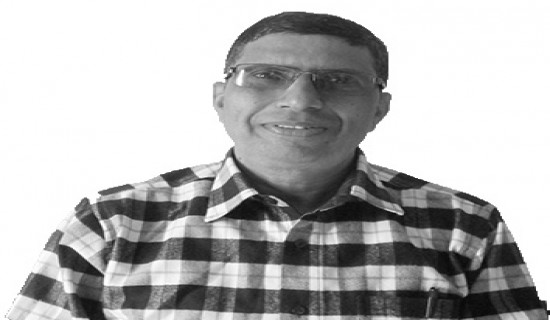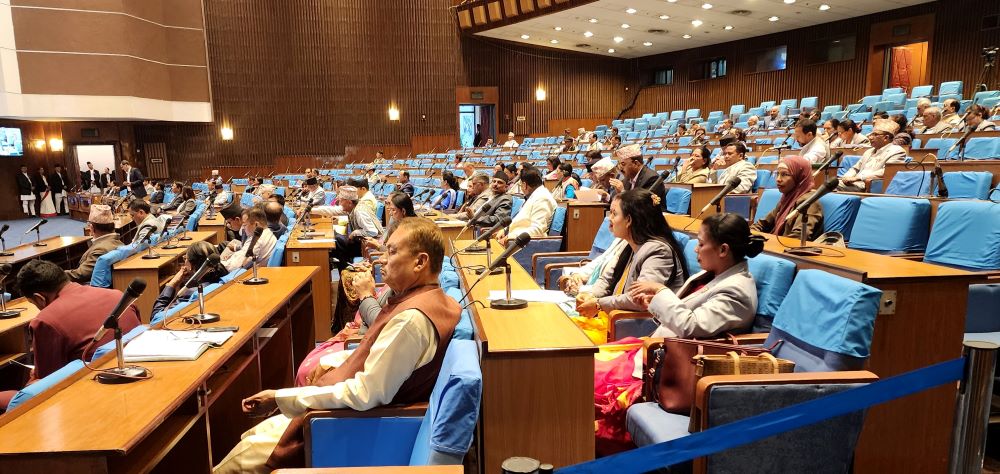- Wednesday, 3 September 2025
Red Panda Study Centre established
By Chandra PandakTaplejung, Apr 18 : A Red Panda Study and Research Centre has been set up at Deurali near Suketar, a tourist area of Taplejung.The district-based Himalayan Conservation Forum and the Red Panda Network have built the Red Panda Study and Research Centre at Deurali Community Forest in Handewa, Phungling Municipality-9. The centre has been set up to study and research biodiversity and wildlife, said Ramesh Rai, programme coordinator of the Himalayan Conservation Forum. According to Rai, structures including buildings have been constructed at a total cost of Rs. 1.57 million. Rai informed that the physical infrastructure has been constructed with the financial support of Red Panda Network and the facilitation of the forum. Organic construction materials have been used for the construction as it is an environmentally-friendly structure, he said.According to Amrit Bhattarai, project supervisor of construction company SNP, environment-friendly raw materials and locally produced materials have been used in the construction of the structure.Bhattarai said that a mixture of dung, ash, eggshell, pure mustard oil, lime, clay and straw was used in the construction of the resource centre. He said that these materials will make the structure environment-friendly as well as strong, durable and weather-friendly. At present, the construction work of the building is about 99 per cent complete and it is said that it will be operational soon.It is believed that the establishment of the centre will help in the conservation of forests and rare wildlife, said Nimakriya Sherpa, chairperson of Deurali Inner Community Forest Users Group.Sherpa said that the centre has been set up with the objective of increasing the income of the consumer group by conserving local biodiversity, promoting environment-friendly services, and utilizing tourism with good use. He said that there is also a plan to develop it as an exhibition centre for the protected species including rare red panda and herbs.
DIG Aryal recommended for promotion
The Home Ministry has recommended Deputy Inspector General of APF, Raju Aryal, for the promotion to the post of Additional Inspector General.
Fright From The Right
P Kharel, Personalized politics and petulant attitude sharply shrunk the popularity meter of France’s President Emmanuel Macron as quickly as he rose to the seat of power in 2017. However, the first-round presidential election last week on April 10 left him almost high and dry in that Marine Le Pen gave him the shake-up neither he nor his close supporters had expected. Macron’s reelection bid triggered nail-biting suspense until the last minute. British Prime Minister Boris Johnson might have savored a personal satisfaction of the French leader’s setback, though not all is lost yet, given the petty politics Macron,45, unrolled against the United Kingdom’s trade interests following Britain’s formal pullout from the European Union membership. That is how voter verdicts build up. National Rally party leader Le Pen closed in on Macron’s margin of lead in the opinion polls day by day in the closing fortnight. Reality dawned on Macron as to how far he had lost large voter support because of his arrogant style. He made noises about vainly trying to become a self-appointed peacemaker to the Ukraine crisis. Moscow did not trust him, as it concluded he would side with the US-led herd when the crunch came. Macron’s career at the summit of French power began when he was nearing 40 years in May 2017 and entered the 500-year-old Elysee Place which serves as the residence-cum-office for the country’s executive president. He had secured 66.1 percent of the votes in the second round but with support from candidates that lost the first round and did not want Le Pen to win. Whereas France was seen as supporting some of its other European cousins that advocated identity politics at the micro-level far and wide, the same has begun to bug French politics now, much to the consternation of the country’s self-declared liberals. The May presidential elections have shown that the status quo in the existing equation in outlook is changing in France and elsewhere. The trend is likely to gain ground in the coming times, as growing dissatisfaction marks electoral politics.Economic equality and disguised forms of discriminatory practices have made people fed up with the existing conditions. Derided by the political elite who bask in the status quo that turns the wheels of their profit-making machines and acknowledges their resultant station in society, the term populism is downplayed regarding its growing adherents and overplayed as a weapon of “destabilization”. Le Pen’s surge in political stock has unnerved the hardliners among the status quoits. She has become a symbol of populism, as defined by her critics. The first round established her firm and solid as a force to reckon with rather than a temporary phenomenon destined to peter out in the not far future. Reality speaksPublic opinion polls consistently give Russian President Vladimir Putin approval ratings of more than 70 percent — something most of his counterparts in Western democracies do not maintain even in their first few years in office. Russians, in general, see Putin as a man who restored law and order, stabilized the economy, and restored Russian pride as a force to reckon with. In France, voter abstention plays a crucial role. Should supporters of the leftist group decide not to show up in the run-off slated for next Sunday, Le Pen’s prospects for the presidency will soar. Her father Jean-Marie Le Pen entered the second round in 2002 but rival parties combined to vote against him just as the daughter, too, faced a similar situation in 2017. The recent voting trend shows that French youth do not feel as duty-bound to cast their ballot as the older generations have done after World War II. This gives the anti-Le Len sections the jitters. In previous instances, the left groups supported the leading candidate to prevent the far-right candidate from victory. In the recent first-round polls, Macron obtained a little less than 28 percent of the votes cast against Le Pen’s 23 percent-plus and the far-left Jean-Luc Melenchon’s 22 percent. Now that he is out of the race, Melenchon has made an appeal to his supporters to vote for the incumbent president. Former President Nicolas Sarkozy, who was found involved in a “corruption pact” of bribery and influence peddling, has pledged to support Macron in exchange of a promise to have him appointed as the next prime minister. This all carries political baggage that could erode the credibility of parties engaged in traditional politics. More to the rightMeantime, Hungary’s President Viktor Orban won a landslide majority of voters for the fourth consecutive time. The traditional European powers groaned under the weight of the outcome they deeply hated and moaned over such tendencies in other locations as well. Introspection and critical thinking have led large sections of voters, especially the youth and economically hard-pressed, to look for viable alternatives. Having faced severe shortages and galloping inflation in the initial years after the 1991 disintegration of the Soviet Union, the Russian people underwent highly trying times. When Vladimir Putin became president in December 1999 to complete the remaining year of Yeltsin’s term, he swung into the action of robust campaigning. He not only obtained a fresh full term in office on his own but has wielded power ever since. These are times, when new world order is emerging, whose early signs have started unfolding. Its course, shape, and outcome will determine social and national outlook, international and economic ties, and power equations. The traditionally privileged will dig their heels deep to keep their positions from sliding whereas the new forces will not let down their ambitions for a larger say and share in setting agendas.(Professor Kharel specializes in political communication.)
JEOC to be established to conduct elections in effective way
A joint election operation centre (JEOC) is to be established at the Election Commission on April 23 under the coordination of the EC.
Think deep to curb drowning
By Nayak PaudelKathmandu, Apr 18 : Ranjan Shrestha, a 22-year-old permanent resident of Dolakha, and his friends had gone to Ward No. 9 of Chautara Sangachowkgadi Rural Municipality of Sindhupalchowk district from Kathmandu for recreation.On Saturday afternoon, the group had gone to the Sunkoshi River for swimming. However, during the recreation, Shrestha went missing in the river.“Shrestha dived too deep and went missing. He was later found dead,” said Deputy Superintendent of Police (DSP) Dakshya Kumar Basnet.DSP Basnet, who is also the spokesperson for District Police Office, Sindhupalchowk, added, “There were around seven of them in total. Three of the friends were outside the river when the incident happened. It was already late when professionals had reached the scene for rescue.”According to DSP Basnet, the group had gone to a secluded place due to which they couldn’t receive help at the earliest.The daily news bulletins of the Nepal Police Headquarters show that 16 individuals, including seven children, have died of drowning across the country in the past two weeks from April 3 to April 16. “We have reviewed the cases of drowning incidents in Nepal with the help of Nepal Police data and it is worrying,” said Dr. Dijan Bhattarai, spokesperson for the National Disaster Risk Reduction and Management Authority (NDRRMA).More than 500 cases of drowning are likely been recorded across Nepal annually in recent years.As the days are hot, people, mostly from Terai, visit water bodies nearby or far for swimming. However, lack of knowledge about the respective water mass and inability to swim well has been leading to deaths.“Mostly children are in risk of drowning and the major reason is lack of proper surveillance by the family members. Children drown in small sources of water due to which they need to be monitored well,” said Bhattarai.Dev Raj Yadav, an eight-year-old of the Saptari district, was seriously injured after he got drowned while swimming at a local pond on April 10. He died while being rushed to the hospital.Kanchan Gole, a five-year-old of Sindhuli district, also died of drowning on April 10. She drowned while swimming at Bagmati River in Ward No. 1 of Chandrapur Municipality of Rautahat district. According to the World Health Organisation (WHO), there are an estimated 236,000 annual drowning deaths worldwide. It also states that the highest drowning rates are among children aged 1–4 years, followed by children aged 5–9 years.“Local-level governments have a major role alongside the parents to prevent drowning incidents among children. However, seeing many adults drowned it can be said that there is a lack of awareness among people of all the age groups,” said Bhattarai, who is also a government under-secretary. Other than the local level’s responsibility, officials argued that there were no initiatives from the provincial and federal levels.Meanwhile, drowning prevention had received less priority not only in Nepal but on a global scale.It was only in April 2021 that the UN General Assembly decided to celebrate July 25 of every year as “World Drowning Prevention Day” with the motto “Anyone can drown, no one should”.“We have also been aware of the losses by drowning. We are coming up with new plans and policies to prevent drowning incidents through coordination with UNICEF,” said Bhattarai.Experts stress that teaching school-age children basic swimming, water safety, and safe rescue skills can be a proper approach to preventing drowning. The WHO suggests that installing barriers controlling access to water, providing safe places away from water, training bystanders in safe rescue and resuscitation, setting and enforcing safe boating, shipping and ferry regulations, and improving flood risk management can also prevent drowning.
Price of vegetables soars in Kanchanpur
Kanchanpur, April 18: Inflation of vegetables has increased in Kanchanpur district due to the lack of availability of vegetables in markets following a decline in local production in the recent period. Production of vegetables has declined due to sudden changes in weather. Former Chairperson of Kanchanpur Vegetable Entrepreneurs' Association, Tarka Raj Bhatta, said that though the local productions—pumpkin, brinjal, bottle gourd are in the market, other vegetables are being imported from the Indian market. Vegetables like onion, potato, long bean, tomato, okra, and carrot are being imported regularly from India. Bhatta said tomatoes cultivated by farmers got damaged due to sudden changes in weather and the supply of local productions was low as compared to previous years. Sample test of the vegetables imported from India via the Gaddachauki checkpoint is carried out at a lab located at a vegetable market, Attariya, of Kailali. Tomato cultivated by Khyaliram Barma on around 15 kattas of land at Bhimdutta municipality-19 has been completely damaged due to rain and excessive cold. He had planted tomatoes in the month of November. Barma, who is involved in vegetable farming for the past 13 years, said that the price of tomatoes and lemon has skyrocketed. Though the price of bottled gourd and pumpkin has become cheaper, the price of other vegetables is high, said, businessmen. A vegetable businessman, Anil Prasad Chaudhary, said that they are now compelled to sell a piece of lemon at Rs 20 after the price of lemon reached Rs 500 per kg. Although the supply of vegetables produced in the district is low, there is no lack of vegetables in the market.
Ukrainian defenders in Mariupol defy surrender-or-die demand
By ADAM SCHRECK and MSTYSLAV CHERNOVKYIV, Ukraine Apr 18 , (AP) — Ukrainian fighters who were holed up in a massive steel plant in the last known pocket of resistance inside the shattered city of Mariupol ignored a surrender-or-die ultimatum from Russia on Sunday and held out against the capture of the strategically vital port.The fall of Mariupol, the site of a merciless 7-week-old siege that has reduced much of the city to a smoking ruin, would be Moscow’s biggest victory of the war and free up troops to take part in a potentially climactic battle for control of Ukraine’s industrial east.Capturing the southern city would also allow Russia to fully secure a land corridor to the Crimean Peninsula, which it seized from Ukraine in 2014, and deprive Ukraine of a major port and its prized industrial assets.As its missiles and rockets slammed into other parts of the country, Russia estimated that 2,500 Ukrainian troops and about 400 foreign mercenaries were dug in at the sprawling Azovstal steel mill, which covers more than 11 square kilometers (4 square miles) and is laced with tunnels.Many Mariupol civilians, including children, are also sheltering at the Azovstal plant, Mikhail Vershinin, head of the city’s patrol police, told Mariupol television on Sunday. He said they are hiding from Russian shelling, and from any occupying Russian soldiers.Moscow had given the defenders a midday deadline to surrender and “keep their lives,” but the Ukrainians rejected it, as they’ve done with previous ultimatums.“We will fight absolutely to the end, to the win, in this war,” Ukrainian Prime Minister Denys Shmyhal vowed on ABC’s “This Week.” He said Ukraine is prepared to end the war through diplomacy if possible, “but we do not have intention to surrender.”As for besieged Mariupol, there appeared to be little hope Sunday of military rescue by Ukrainian forces anytime soon. Foreign Minister Dmytro Kuleba told CBS’ “Face the Nation” that the remaining Ukrainian troops and civilians in Mariupol are basically encircled. He said they “continue their struggle,” but that the city effectively doesn’t exist anymore because of massive destruction.Ukrainian President Volodymyr Zelenskyy sent Easter greetings via Twitter, saying: “The Lord’s Resurrection is a testimony to the victory of life over death, good over evil.”If Mariupol falls, Russian forces there are expected to join an all-out offensive in the coming days for control of the Donbas, the eastern industrial region that the Kremlin is bent on capturing after failing in its bid to take Kyiv, Ukraine’s capital.The relentless bombardment and street fighting in Mariupol have killed at least 21,000 people, by the Ukrainians’ estimate. A maternity hospital was hit by a lethal Russian airstrike in the opening weeks of the war, and about 300 people were reported killed in the bombing of a theater where civilians were taking shelter.An estimated 100,000 remained in the city out of a prewar population of 450,000, trapped without food, water, heat or electricity in a siege that has made Mariupol the scene of some of the worst suffering of the war.“All those who will continue resistance will be destroyed,” Maj. Gen. Igor Konashenkov, the Russian Defense Ministry’s spokesman, said in announcing the latest ultimatum.Drone footage carried by the Russian news agency RIA-Novosti showed towering plumes of smoke over the steel complex, which sits on the outskirts of the bombed-out city, on the Sea of Azov.Ukrainian Deputy Defense Minister Hanna Malyar described Mariupol as a “shield defending Ukraine” as Russian troops prepare for battle in the mostly Russian-speaking Donbas, where Moscow-backed separatists already control some territory.Russian forces, meanwhile, carried out aerial attacks near Kyiv and elsewhere in an apparent effort to weaken Ukraine’s military capacity ahead of the anticipated assault.After the humiliating sinking of the flagship of Russia’s Black Sea Fleet last week in what the Ukrainians boasted was a missile attack, the Kremlin had vowed to step up strikes on the capital.Russia said Sunday that it had attacked an ammunition plant near Kyiv overnight with precision-guided missiles, the third such strike in as many days.Explosions were also reported overnight in Kramatorsk, the eastern city where rockets earlier this month killed at least 57 people at a train station crowded with civilians trying to evacuate ahead of the Russian offensive.At least five people were killed by Russian shelling in Kharkiv, Ukraine’s second-largest city, on Sunday, regional officials said. The barrage slammed into apartment buildings and left the streets scattered with broken glass and other debris, including part of at least one rocket.Kharkiv Mayor Igor Terekhov, in an impassioned address marking Orthodox Palm Sunday, lashed out at Russian forces for not letting up the bombing campaign on such a sacred day.And Zelenskyy, in his nightly address to the nation, called the bombing in Kharkiv “nothing but deliberate terror.”A regional official in eastern Ukraine said at least two people were killed when Russian forces fired at residential buildings in the town of Zolote, near the front line in the Donbas.Zelenskyy said Russian troops in parts of southern Ukraine have been carrying out torture and kidnappings, and he called on the world to respond with more weapons and tougher sanctions.“Torture chambers are built there,” he said in his address. “They abduct representatives of local governments and anyone deemed visible to local communities.”Malyar, the Ukrainian deputy defense minister, said the Russians continued to hit Mariupol with airstrikes and could be getting ready for an amphibious landing to reinforce their ground troops.The looming offensive in the east, if successful, would give Russian President Vladimir Putin a vital piece of the country and a badly needed victory that he could sell to the Russian people amid the war’s mounting casualties and the economic hardship caused by the West’s sanctions.Austrian Chancellor Karl Nehammer, who met with Putin in Moscow this week — the first European leader to do so since the invasion Feb. 24 — said the Russian president is “in his own war logic” on Ukraine.In an interview on NBC’s “Meet the Press,” Nehammer said he thinks Putin believes he is winning the war, and “we have to look in his eyes and we have to confront him with that, what we see in Ukraine.”
Ronaldo hat trick boosts Man United’s CL hopes
APManchester, Apr 18 : Cristiano Ronaldo capped his hat trick with a stunning free kick in the 76th minute to give Manchester United a 3-2 win over Norwich on Saturday and boost the team’s hopes of securing a Champions League spot.United moved past Arsenal into fifth place, three points behind Tottenham in the English Premier League.City and Liverpool look sure to qualify for the Champions League again. The rest of the Premier League’s top four is more up for grabs, with Manchester United’s pursuit helped by Tottenham and Arsenal losing.United blew a two-goal lead after last-placed Norwich fought back to tie the game on goals by Kieran Dowell and Teemu Pukki at Old Trafford.But the day belonged to the Portugal superstar, who recorded the 50th hat trick of his professional career for his clubs and 60th overall.Ronaldo’s goal in the seventh minute was courtesy of Anthony Elanga, who stole the ball from defender Ben Gibson in the area and slid a pass to him for an easy one-timer past goalkeeper Tim Krul. Ronaldo then headed home a corner kick in the 32nd. Ronaldo’s free kick from outside the area sailed through the wall and off Krul’s outstretched hands into the top left corner of the net.Just before halftime, Pukki’s cross from the left side was headed in by Dowell to give the visitors hope. Dowell then returned the favor in the 52nd by threading a pass to Pukki, who took two touches and beat goalkeeper David De Gea to the near side and in off the right post.Cristiano Ronaldo’s hat trick secured a 3-2 victory over Norwich after the last-placed team fought back from two goals down. United moved above Arsenal and into fifth place.Tottenham is still fourth but only three points ahead of United after Leandro Trossard’s goal in the 90th minute gave Brighton a 1-0 win in north London.Arsenal is on the slide. A fourth loss in five games was inflicted by Southampton with Jan Bednarek sealing a 1-0 win.Watford slipped closer to relegation after losing 2-1 to Brentford, which moved into 11th place in its first Premier League campaign. Villarreal winGerard Moreno scored one goal and set up another before the Villarreal striker was substituted because of injury during his team’s 2-1 win at Getafe in the Spanish league on Saturday.Despite struggling with injuries this season, Gerard has been a key player in Villarreal’s impressive run to the Champions League semifinals after ousting Juventus and, this week, Bayern Munich in the knockout rounds.Gerard gave Villarreal the lead in the seventh minute and helped to make it 2-0 in the 16th when he stole the ball in midfield to start a counterattack. The Spain striker, who also set up Samuel Chukwueze’s late winner to topple Bayern on Tuesday, again made the key pass by playing Manuel Trigueros clear to beat David Soria.Gerard had to be substituted in the 61st after he was attended by team doctors. He touched the back of his right thigh before walking off gingerly.Emery said Gerard had a muscular injury but team doctors had yet to determine how long he would be out, leaving in question his availability for the European semifinals against Liverpool in two weeks.
New multiplex comes into operation
By A Staff ReporterKathmandu, Apr 18 : A new multiplex has come into operation in the capital after the daily cases of COVID -19 declined to less than 20.When Kirtipur Cineplex, Ranjana Cineplex, Om, Namah and Shivaya cinemas of Gopi Krishna Movies have already been in operation after the lifting of the COVID -19 restrictions, Durbar Cinemax has come into operation at Durbar Mall of Durbar Marga. Ranjana Cineplex was closed for many years while Om, Namah and Shivaya cinemas were closed two years ago. QFX has managed Durbar Cinemax, owned by Guna Cinema Group that has been operating Guna Cinema Hall in Gwarko, Lalitpur, for the past two and a half decades.Durbar Cinemax has two halls with a capacity of 50 and 53 seats and equipped with sophisticated sound system, folding seats and screen. Managing Director of Durbar Cinemax Diprash Shakya informed that the audience can watch the movie as per their wish in the hall. Food and bar services are also available inside the hall.Managing Director Shakya said that the luxury hall has been brought into operation keeping in mind the interest, safety, quality technology and convenience of the audience.He informed that both the halls have come into operation by screening Nepali film A Mero Hajur-4 and South Indian film KGF Chapter–2.
Typhoid vaccination begins in Bajura
By Our Correspondent Bajura, Apr 18 : Administering vaccine against typhoid has begun in Bajura from Sunday under the government’s nationwide vaccination campaign. Under the three-week nationwide campaign, all children aged between 15 months and 15 years are receiving the jab. The nationwide campaign aims to achieve wider protection from typhoid, increase the impact of the vaccine introduction and combat the rise of antimicrobial resistance. Around 58,000 children from all the nine local levels will be inoculated the typhoid vaccine. The campaign will be conducted from April 17 to April 21 from 348 vaccination centres of the district. According to the Health Office (DHO) Bajura, 348 health workers and more than 600 volunteers have been mobilised for the vaccination campaign. The district is administering the vaccine against typhoid for the first time. The DHO has requested all the targeted children to reach the nearest vaccination centres and receive the jab.“We received the vaccine today and started the campaign,” said Daya Krishna Panta, chief at DHO, Bajura. On April 7, the government launched the vaccine campaign introducing Typhoid Conjugate Vaccine (TCV) into the routine immunisation programme across the nation.
Tourism Board honours BBC Master Chef's team
By A Staff ReporterKathmandu, Apr 18 : Nepal Tourism Board (NTB) on Sunday honored the finalists of BBC Master Chef: The Professional 2020. In a program organized in Kathmandu, the team of chefs including Alex Wave, Alex Wave, Bart van der Lee, and Philli Armitage along with Master Chef Santosh Shah was received by the Chief Executive Officer of the Board, Dr. Dhananjay Regmi as well as board members and directors.Dr. Regmi said that Shah has added a new dimension to Nepal's tourism by introducing Nepali cuisine to the world. "Nepal is considered as a beautiful destination by tourists but after Master Chef Santosh Shah introduced Nepali food to the world, it conveyed the message that Nepal is also an important destination in terms of culinary tourism,” he said. Shah said that he was proud to bring Nepali food to the world stage. He also urged the team that came with him to come back to Nepal and experience Nepal up close again. Similarly, Wave, Lee, and Armitage said that they were happy to visit Nepal and learn about the art and culture here. Nepal's tourism sector was devastated by the COVID-19 pandemic but is slowly returning to normalcy. A team of Chefs including Shah has been in Nepal since April 7 during the 'Master Chef Finalist Tour to Nepal' tour program organised by the Nepal Chapter of Pacific Asia Travel Association (PATA) under the promotion of the post-epidemic tourism revival campaign promoted by NTB.
Farmers halt sugar supply
By Our CorrespondentSarlahi, Apr 18 : The farmers of Sarlahi have halted the supply of sugar from Mahalaxmi Sugar Factory in Bagdaha of Godaita Municipality.The farmers hadn't been paid for the sugarcane for two months even though sugar was being sold in the market which made the angry farmers block the supply. The farmers insisted that they wouldn't allow the supply unless their dues are paid.The farmers have stopped three trucks – State 2-03-001 Kha 3057, Na 6 Kha 2173, and Na 5 Kha 7387 – from the factory which was bound for Kathmandu with sugar. Due to obstruction from the farmers, the trucks were unloaded in the factory's storehouse.Sugarcane farmer Ram Dinesh Yadav said they had to protest because the factory didn't pay them. "The factory had earlier promised to pay the sugarcane dues in cash. Now, they have started selling sugar in the market but haven’t paid us our money," said Yadav.Mahalaxmi Sugar Factory crushed 890,000 quintals of sugarcane this year before being closed on March 3. The factory still has Rs. 1.8 million in dues to pay the farmers.The factory insisted that it was paying the farmers. The owner of Mahalaxmi Sugar Factory Birendra Kanodia said, "About 90 percent of farmers are already paid and the remaining amount will also be paid gradually.”Industrialist Kanodia said a few agents were causing unwanted trouble in the factory in the name of the farmers. Among the three sugar factories of Sarlahi, there was no complaint regarding payment from Indushankar Sugar Factory of Harrison and Annapurna Sugar Factory of Dhankaul.The sugarcane farmers said they have not been given government grants this year as well. The sugarcane farmers seem agitated after not being paid in time by the factory and the government.
Electoral Alliance
As the country is heading towards the local polls slated for May 13, electoral alliances among the political parties have become a defining characteristic of contemporary politics. Both ruling and opposition parties have forged alliances with like-minded forces. The constituents of the current five-party coalition – Nepali Congress (NC), CPN-Maoist Centre, CPN-Unified Socialist, Janata Samajbadi Party (JSP) and Rashtriya Janamorcha – have decided to go together in all three-tier polls. Similarly, the main opposition CPN-UML has recently struck a deal with Rashtriya Prajatantra Party-Nepal and Pariwar Dal to jointly contest the upcoming local elections. It is natural in the democratic setup for the parties to ally with their compatible counterparts to muster more seats in the polls. Nonetheless, the political parties are expected to respect the basic norms and values of democracy while entering the poll alliance. Ideological coherence, constitutional spirit and political ethics must not be undermined. If the parties forge unnatural alliances, guided by parochial interest and political vendetta, this will hurt democratic culture and the prospects of consolidating the democratic republic through the periodic poll which is a crucial democratic exercise. The ruling coalition came to power with a commitment to safeguarding the republican constitution and federal parliament. It has fought together to save the parliamentary sanctity. It has an august duty to ensure institutionalization of democracy, implementation of the constitution, and safeguarding the hard system from derailing and coming under threat. The reinstatement of the parliament and formation of a coalition government as per the historic verdict of the Supreme Court did not only bring the constitution back on track but also averted the possibility of plunging the nation into another vicious cycle of instability. This is a reason that coalition partners have decided to continue supporting each other in the upcoming local level elections by shelving their differences. Last week, issuing a joint statement, the top leaders of the ruling coalition urged all their leaders and cadres to work out an electoral alliance framework and move ahead with a spirit of mutual collaboration and cooperation. The ruling coalition insists that it needs solidarity to protect the nation and democracy from the anti-change and regressive forces while protecting Nepal’s sovereignty, independence, people’s freedom and progress. No doubt, the coalition will be able to ensure stability, inclusive democracy and desired prosperity if they translate their pledge into action.For this, they should secure people’s robust mandate. This requires them to support each other in the polls without conditions and by sorting out the dissatisfaction of the grassroots cadres. Political honesty is necessary to make sure that the candidates receive public support and get elected in the elections. Against this backdrop, Prime Minister and Nepali Congress President Sher Bahadur Deuba has said that his party would not betray the ruling parties’ decision to forge the electoral alliance in the upcoming local polls. PM Deuba has not mince words when he said that he became the PM with the support of the coalition parties. As the largest ruling partner, NC has an important responsibility to implement the decisions of the high-level political mechanism with regard to the poll alliance. PM Deuba’s commitment to supporting the coalition parties in the election will create an atmosphere of confidence and cooperation among the allies, thereby living up to the values of public morality and trust in politics.
Correct Information Key To Fair Polls
Ballav Dahal, Free, impartial, and responsible media is one of the pillars of democracy as it enables people to make informed decisions during elections. Voters can elect honest, committed, capable and visionary leaders as their representatives only when the former is well-informed about the parties and their candidates. There is no denying the fact that disseminating the right information at the right time through proper channels is required for empowering people to vote for the deserving candidates. When such representatives come to power, they could emerge as a change-maker by working as per the needs and aspirations of the common masses. As Nepal is preparing for the second local elections on May 13 this year after the creation of the federal system of governance, the Election Commission (EC), other government bodies, and political parties have an important role to play in circulating all the electoral information in a more effective manner. Even amidst a rising literacy rate in the country, many people can still easily be misled by the spread of fake and distorted information. Curbing fake message Participants in the interaction on ‘Transmission of the Right Information in the Electoral Process’, which was organized by the National Information Commission recently, expressed the same concern. They emphasized the need for the government and the election body to remain vigilant against the possible dissemination of misinformation, disinformation, and mal-information and step up prompt measures accordingly. The dissemination of the false messages is likely to misinform voters, which, in turn, could lead to the election of the wrong candidates. Thus, the spread of the proper information on time is vital for strengthening democracy. Only dedicated and visionary representatives could help deal with all the pertinent problems facing people and expedite the process of overall development at the local levels. With the advancement of digital technology, there has been a growing use of social media platforms for disseminating electoral information worldwide. As people in Nepal have also better access to the internet, such social media platforms could be of immense use for spreading the poll information. Those sites could be relatively cheap and efficient to disseminate election-related information and mobilize voters. Such sites facilitate candidates to better reach out to their voters and engage them in the poll campaigns. Since social media sites have turned out to be an important part of our day-to-day life, they could be used as the key channels for canvassing. But such platforms need to be monitored properly in view of the higher chances of the fake information being transmitted. It is needless to mention that false information travels faster than the truth. The spread of such information may be detrimental to a free and fair election. The use of social media sites can cause misrepresentation of accurate voter information in regard to voting methods, location and time. There are also chances of voter frauds, provocation for violence and spreading of hate speech. Another possible risk is related to online harassment of women candidates. Taking all this into serious consideration, the EC seems to have remained watchful against the probable misuse of social media during the local polls. Local elections are very significant in the sense that they contribute to strengthening the grassroots democracy. The Constitution of Nepal, 2015 upholds the importance of the local government, which is directly associated with the people. So, the local government institutions are considered the foundation of democracy. It can be easier for the state mechanisms to take the benefits of democracy to the people when the local government is vibrant and capable enough to carry out its responsibilities well. The formation of a responsible, accountable and transparent local government is possible only through fair elections. With increasing security threats, conducting such polls is quite challenging.What is another worrisome matter is that the country has witnessed a considerable increase in election expenses over the years. Even several top leaders belonging to different political parties have realized this. If this type of unwelcome trend continues, all the elections — be it local, provincial or federal — may become so expensive that only well-off candidates could afford to contest them. When money becomes dominant in elections, it can create a lot of political anomalies. Poll codeTo check such problems, the EC has fixed a ceiling of expenses for those vying for different positions of the local government such as mayor, deputy mayor, ward chairpersons, and ward members (in metropolis, sub-metropolis, and municipalities) and chairman, deputy chairperson, war chairperson and ward members (in rural municipalities). The election body has also implemented a code of conduct for the political parties and the concerned candidates when it comes to poll expenses and other election-related activities. In addition, the EC’s poll code comes into effect even for the government, its ministers, public institutions, local levels, poll observers, civil servants, security agencies, media outlets, and those holding public positions. As part of the election process, the code of conduct, if followed strictly, could be helpful for holding the upcoming local polls in a free, fair, and fearless environment. The EC needs to ensure that all the stakeholders abide by the code of conduct in letter and spirit in order to perform its important responsibility of conducting the local polls in a dignified manner. Only then can genuine representatives make it to the local government institutions.(Dahal is Deputy Executive Editor of this daily.ballav.dahal@gmail.com)
Looming Food Crisis
Claudia Isabel RittelRussia’s attack on Ukraine will have considerable impacts on global food security. The two countries account for about 30 percent of international cereal exports. Reduced supply may mean famine for millions of people.In normal times, Ukrainian farmers spend the first two weeks in March working hard to ensure a good harvest later in the year. This time, many did not fertilize fields. Instead, they were fighting to protect their country or had fled. Apart from Ukrainians, millions of people around the world will thus suffer an impact of the war. Ukraine has basically stopped exporting wheat. The ports are no longer operational, and many companies have closed down. Russian grain exports, moreover, have also been reduced considerably, though food is excluded from the sanctions that were imposed on Russia in March. However, professional observers report that international traders have voluntarily discontinued their Russian business. Compounding matters, Russia has declared it will stop grain exports. Global wheat prices have thus increased fast, from a comparatively high base.To some extent, higher energy costs are driving that trend too, says Christine Chemnitz, an agriculture analyst who works for the Heinrich-Böll-Foundation, which is close to Germany’s Green party. Other relevant issues include uncertainty about future harvests and more expensive insurance premiums for freight ships navigating the Black Sea.Chemnitz says that the speculation on commodity exchanges so far has not had a major impact, while Chinese imports have made a difference. The People’s Republic has been buying huge volumes for a while and started importing wheat from Russia on 24 February, according to the news agency AP. That was the very day Russian troops invaded Ukraine. Christof Buchholz, the executive of an umbrella organization of cereal traders in Hamburg, states that global trade patterns are changing dramatically. Some observers believe that China may be storing cereals for geostrategic purposes.Martin Rentsch of the World Food Programme (WFP) warns that some countries will be unable to cope with higher prices and thus face serious consequences. He points out, for example, that wheat is the second most important staple food in Kenya, where local producers only supply about 10 percent of what consumers buy. The scenario is similar in other African and Asian countries. According to the UN Food and Agriculture Organisation (FAO), up to an additional 13 million people may now suffer from hunger. In the medium term, higher prices will affect the WFP, which provides food to people in crisis regions around the world. Its stores are currently full, Rentsch says, but higher prices mean the agency will not be able to buy as much as planned in the future unless its funding is increased. The tough choice will then be to either serve fewer people in humanitarian need or to reduce individual portions. The worst scenario would be having to cut hungry persons’ rations in order to save others from starvation.At this point, it is impossible to assess what global supply will look like in the coming months. Open questions include to what extent Ukrainian farmers can sow wheat now and harvest in the summer. -Development And Cooperation


